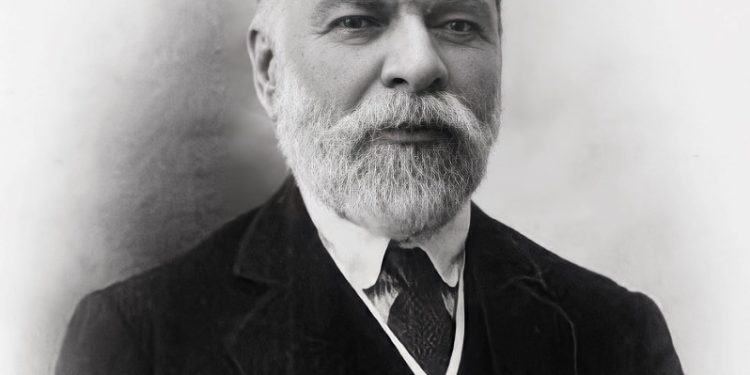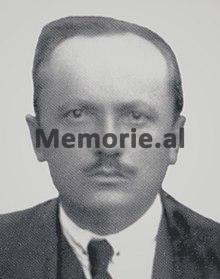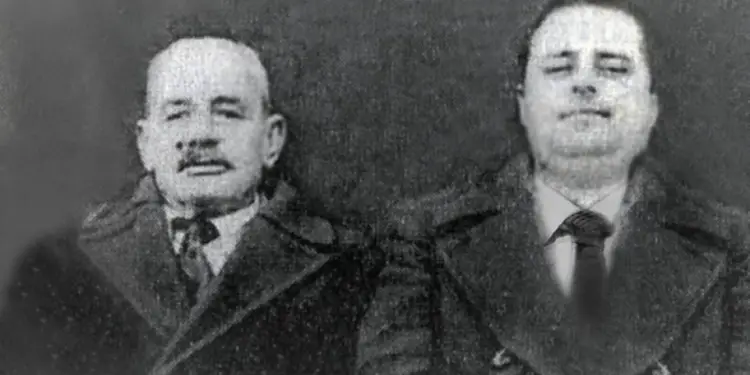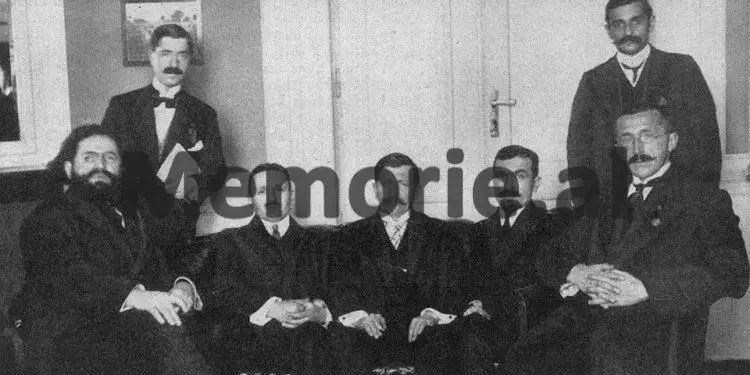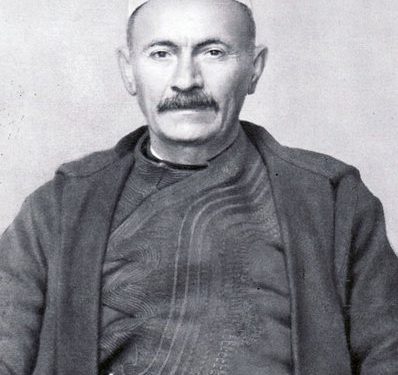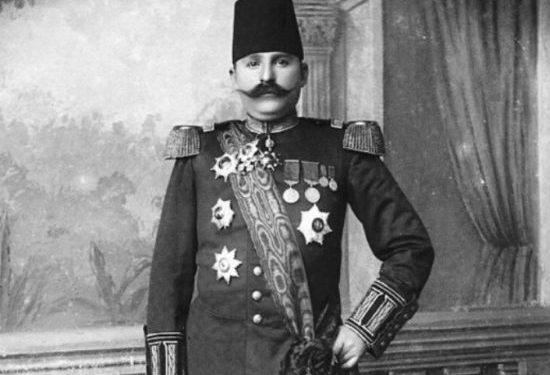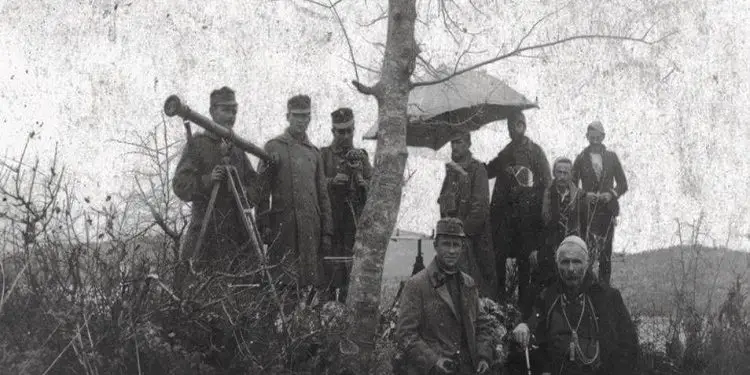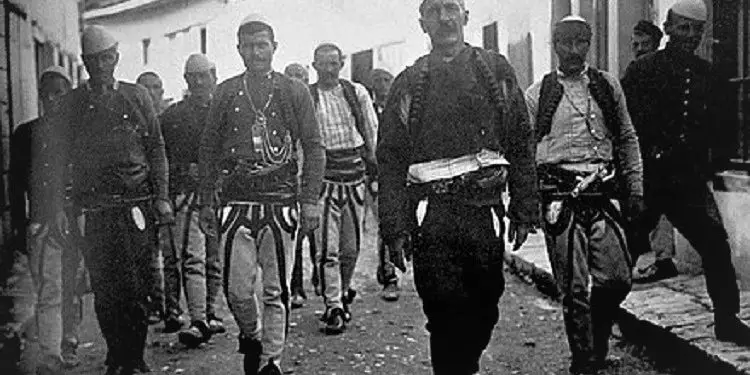By Sejfi Vllamasi
The first part
Memorie.al / From all the provinces of Albania, people’s delegates and a majority of patriots arrived, from inside and outside Albania, and on November 28, 1912, amid great enthusiasm, after 450 years of captivity, the flag was raised national and the independence of Albania was declared. A government was formed under the chairmanship of Ismail Qemali, in which Preng Bibdod Pasha also participated as deputy prime minister and Esat Pashë Toptani as minister of the interior. When Ismail Qemali arrives in Vlora, Seit Qemali, Murat Tërbaçi, Alem Mehmeti and many other patriots, as reservists, fought against the Greek army in Llogara. These, upon being informed about the purpose of the Elder’s arrival in Vlora, raised the national flag at the front of the war, before it was raised in Vlora.
At the same time, from all the provinces of Albania, the people’s delegates and a majority of patriots arrived, from inside and outside Albania, and on November 28, 1912, amid great enthusiasm, after 450 years of captivity, the flag was raised national and the independence of Albania was declared. A government was formed under the presidency of Ismail Qemali, in which Preng Bibdod Pasha also participated, as deputy prime minister, and Esat Paşe Toptani, as minister of the interior. The jurisdiction of this government extended to Berat, Skrapar and Elbasan, as the Turkish army was located in Fier and Lushnje, waiting to embark for Turkey.
Duke de Montpanisie, from the French Bourbon family and a great rich man, at the instigation of Albert Gjika and his own ambition, accompanied by Mark Kakarriqi and Pjetër Goxhamani, departs from Brindisi with his yacht and, breaking through the Greek blockade, arrives in Vlorë, where a candidate for the throne of Albania appears. Ismail Qemali accepts his candidacy in principle, but to get the consent of Paris and London, accompanied by Isa Boletini, in national costume, by Luigj Gurakuqi and Pandeli Cali, together with the duke, he goes down to Brindizi and goes to Paris and in London, where he found opinion in favor of Prince Vid. Only by taking advantage of the opportunity, with the steps he took near the Anglo-French governments, he managed to unblock the Albanian coast from the Greek fleet.
Esat Toptani comes to Vlora, but, after he did not find Vlora a suitable environment for his further plans and for securing his life, after two days of stay, he returns to Durrës, where he begins his efforts to form the government of cloud. In Vlora, an assassination attempt was prepared against Esat’s life, but Isa Boletini gives up after consulting with Ismail Qemali, because the latter strictly forbids such an attempt. In principle, Ismail Qemali was against political murders.
The usual intrigues and conspiracies against the Government of Vlora began. Bektash Cakrani, compromised for taking money from Greece, to expand its border to the detriment of the Albanian land, when it is not known for sure, but Qemal Bey Vrioni is also suspected, because his wish was not accepted, for them made Cakran the center of a sub-prefecture, gathers a power and threatens the Government of Vlora with an uprising. But the government, as soon as possible against him, sends a force under the command of Salih Vranishti and Hysni Toska, and after destroying his power; his houses and shops are burned. Bektashi has been in agreement, even with Esat.
On the other hand, Dervish bey Bicaku, the loyal friend of Esat and the sworn opponent of his cousin, Aqif Pashë Elbasan, who at that time was the prefect of Elbasan, of the Government of Vlora, in October 1913, gathered a power against the government, making propaganda with the Qur’an in hand to the people, for insurrection. A force is also sent against him, under the command of Hysni Toska, who, together with Aqif Pasha’s forces in Gododesh, defeated Dervish so badly that he was forced to leave his horse, binoculars and the Koran on the battlefield. Dervish Biçaku, on the other hand, with the Qur’an in hand, has been spreading propaganda in the villages, saying that Prince Vidi and Aqif Pasha will destroy our religion.
The people of Pindi have been for the union of Pindi with Albania. its leaders, who wintered their cattle in Konispol and Delvinë, choose a commission and send it to Vlora, to declare to Ismail Qemali that the people of Pindi have decided to link their fate with the fate of Albania and for the realization of this goal, they are ready to fight against Greece, together with the Albanians. Ismail Qemali accepts it in principle, but Fejzi Alizoti finds out and informs the Control Commission, which revolts against Ismail Qemali.
At the same time, the Young Turks send Captain Beqir Grebenena to Albania, with 4-5 friends, in order to make propaganda for a Turkish prince, for king in Albania, having as a candidate Izet Pasha from Serfixheja, former Minister of War of Albanian origin. The Young Turks attempted such a thing, in order for Albania to become a vassal of Turkey again and thus avoid the fatal consequences that Turkey would suffer from Albanian independence.
Beqir Grebene’s plan, in addition to the legal means that would be used to achieve the goal, included a coup d’état. But fortunately, Beqir Grebenë’s intention is dictated and he is arrested with all his friends in Vlorë, by the Control Commission, which forms a special trial, under the chairmanship of General Dever, head of the Dutch military mission, for the organization of the Albanian gendarmerie, with members: Captain Kasëm Sejdin, Captain Xhavit Leskovik and two other civilians.
Syrja e bej Vlora and the famous jurist and erudite Jorgji Çaku, when they leave Istanbul for Vlora, are advised by the Young Turks to cooperate with Ismail Qemali, to make Izet Pasha king in Albania. But these two inform the ambassador of Austria in Istanbul, to be informed about the Austro-Hungarian policy on the issue of the king of Albania and, later when they came to Vlora, they became witnesses against Ismail Qemali, whose collaboration with Beqir Grebene , is confirmed by the special court of Vlora. Ismail Qemali, was the man of the Entente, of the Anglo-French, and being convinced that the Anglo-French could prefer the election of a Turkish prince, instead of a German prince, he may have been complicit in this matter, to win the sympathy of the Entente, in favor of Albania.
Ismail Qemali pursued a neutral policy towards Austria and Italy, while Austria-Hungary wanted something more than that. Shocked by such pressure, he and a trusted officer send a confidential letter to Admiral Cecil Bornes (English), head of the Inter-Allied Commission in Shkodër, apparently to consult with London, since all his life he has enjoyed the sympathy of her.
But the person in question, out of curiosity, opens the letter and upon understanding its content, he is deeply moved, since like all nationalists of that time, he worshiped Austria, which even for its own interest, for the creation of the Albanian state, went as far as to play the last card, and thus handed over the letter to the Austrian authority in Shkodër. Since then, Austria lost faith in Ismail Qemali. This mistrust increased even more with the instigation of Faik Konica, Dervish Hima and other Austrophiles and she decided to support Esat Toptani.
In addition to Preng Pasha, Aqif Pasha, Abdi bey Toptan, distinguished as patriots, and the Kosovar leaders, the entire pariah of Albania, as well as the intellectuals; Faik Konica, Mit’hat Frashëri, Mehdi Frashëri, Dervish Hima, Abdyl Ypi, Nexhat Libohova and others turned against Ismail Qemalit. This objection, apart from some mistakes of Ismail Qemali, also stems from personal ambitions and grudges.
The Control Commission, based on the implication of Ismail Qemali, in the agreement he made with the people of Pindi, to attempt to modify the southern border, determined by the Conference of Ambassadors, as well as implicated in the case of Beqir Grebene, for a Turkish prince, advises Ismail Qemali to resign from the headship of the government. He immediately resigned and left Albania.
The wars of the Dibrans during the Balkan War
With the destruction of the Turkish army in 1912, the Dibra powers were divided into three:
- Led by Selman Ali and Llan Kaloshi, etc., they went to defend the Shkodra garrison against the Serbs and Montenegrins, under the command of Hasan Riza Pasha, and later Esat Toptan.
- Another part led by Elez Yusuf, Shaban Lusha, etc., went to Kolosnjan (Bicaj), to hinder the progress of the Serbs coming from Kosovo. Elezi was equipped with small artillery of two cannons. In this rather fierce war, a song was woven for Elez that is still sung today in the people, from which we are giving a few verses:
Chris the gun licked the ground,
Elezi comes with two balls.
Chris the ball dribbled
The Serb remembered that he is the king.
I’m not the king of Serbia,
Asht Elezi, with highlands
While the war continued in the River, the Serbs with other powers, passing through Macedonia, reached the Highlands of the Great Dibra, where they encountered the Dibra powers, commanded by the chiefs of the Upper Dibra. In this war, the Serbs used the tactic of compromise by means of local Macedonians, such as Todo Bojaxhiu, a wholesale merchant, who they brought in as mediators to convince the leaders that they (the Serbs) would not pass through Albanian lands, except for Dibra e Madhe (city), which was a strategic place. In this way, the Bosnian powers withdraw and go to their districts, while the Serbs enter the city.
But the cunning Serbs did not keep their word. Later, they send military forces to the various key places of Dibra and try to arrest Elez Yusuf, who was able to escape the siege, in a rather brave and mysterious way. On the other hand, a Serbian force crosses the Topojan Bridge and emerges into the Highlands of the Little Gorge. In the town of Mazhicë, rifles are fired, first with shepherds, and immediately the fight with the enemy begins. After that Malësia e Madhe, Gryka e Vogël e, Gryka e Madhe, Bulqiza e Gollobërdha and all the people are notified by the veteran patriot Mersin Dema to hold a meeting at the graves of Shupenza, which is called the Assembly of the Motherland and according to custom, tie pledge (make itifaq) to fight the Serbian army.
A few days after the agreement, the Serbs, in order to occupy all the provinces of Dibra, cross the Drina and come out to Gryka e Vogël, in the villages of Topojan and Mazhicë. Then the people, according to the oath they had made, rose up against the Serbian army, starting the war in Mazhicë e Topojan village, where Malësia e Peshkopia also took part. The Serbs break and retreat by way of Drin, in the region of Maqellara, in the village of Vojnik, where the commander of the Serbian army, General Ferdinand, remains killed. Then Mersin Dema divides the powers into three parts:
- To the bridge of Topojan;
- In the hills of Gjoric village;
- To Spila Bridge.
Between these countries, the war continues for three weeks. Then the Serbs, finding it impossible to break up the front in these directions, take another direction and, passing through the mountains of Struga and Golloborda, take the wings of the Dibran forces, which retreat and take new positions, occupying the Neck of Murriza (the mountain of Bllac village) and Skrepin of Gjuras village, where the war continued for 5 days. Many Dibras were killed in this war, including Hysen Dema. The Albanians, before the great Serbian powers, retreat to Mat. After they were organized in Mat, together with the Matians, they occupied the third position in Qafe te Murra and in Qafe te Bualli. Here, the war continued for a long time and the Serbs did not advance any further. To this war, the name was given; “War of the Highlands”.
The rest of Dibra prepares for a general revolution against the enemy, deploying forces in Shumbat, Peshkopi and Ura e Lusha. Indirectly, some people from Lower Dibra also went to this war.
The Vllajnica War
At this time, an uprising prepared against the enemy was expected from moment to moment. The leaders of Dibra had decided to hold the uprising without setting a date, but the people, driven by patriotic feelings, spontaneously started the war at Ura e Lusha, on August 15, 1913. At the same time, the war also began in Shumbat, where the enemy was defeated enough badly. Most of the soldiers are killed. The remnants are captured, so that not a single soldier can return to Peshkopi, where large forces were concentrated.
Dibran powers March towards the center (Peshkopi). The enemy from here, makes artillery fire non-stop. When the forces were at Vorret e Pilafi, under the barrage of machine gun bullets, the mountaineer named Mehmet Skepi, a man with a capadai mustache, calls out to his comrades, that: “He who dies today, is immortal”, and calls for them to capture him the living enemy.
Then the people, with an indomitable momentum, attack with confidence and enter the quarters of the city. Azis Lusha is seriously injured here. While his friends try to pull him, he tells them: “Let me die here, because this seems to me the sweetest death, against the enemy” and with these words he dies. After being defeated among the military barracks, the enemy withdraws and enters the city quarters. Malsori Ibrahim, after encountering a platoon of soldiers in an alley, of whom he kills four, but also himself, is seriously injured. When his friends went to pick him up, he tells them not to deal with him, but to go ahead, to kill those who are left. These are just a few examples of the heroism of the Dibrans, in the war against the enemy for the defense of the homeland.
Upper Dibra, upon hearing the artillery fire in Lower Dibra, began to gather in the centers around the chiefs, to make war decisions against the enemy, according to their brothers, are fighting. People’s gathering places were in Maqellare, Kirçisht, Homesh and Sepetovo. A man named Karaman Popinara from Popinarë village, a man with long hair, armed with a martini of the time, accompanied by 20-30 brave men, after coming to Kërvisht village, where 3-400 people are gathered, after the greeting, he addresses and says to Malik Kirçishti: “Why are you waiting any longer? I lead us forward, because time does not wait”! He was told that we have not yet received news from the Lower Dibra, whether the war has definitely begun.
But Karamani said that; “The war has started in our village, you can hear the cannons firing in Peshkopi” and he called on the leaders, saying: “Wake up, men, let’s not sit idly by, let’s march against the enemy and with the hope of God, we will stop in Belgrade”. With this rush, this crowd of people marches towards the city of Dibra, in all directions. In the vicinity of the city, in the village of Krifca, the first attempts were made and, after a severe fight with the Serbian vanguard, consisting of a regiment equipped with machine guns and light artillery, they completely destroyed it. The city is attacked from the west, by the forces of the Highlands of Gryka e Vogël and Gollobërda. Thus, after fierce fighting, the city of Dibra is captured and the remaining enemy forces retreat towards Reka and Gostivar.
The enemy forces that were in Peshkopi were annihilated in the war by the mountaineers of Lower Dibra, and the latter, without being stopped at all, reached Dibra e Madhe to help their brothers, engaged in war against the same enemy. The Dibrans, all united, followed the enemy foot by foot towards Gostivar. In Vllajnica and Mavrovo, the enemy had put large forces, as the place was strategically favorable for defense. In these positions, the war continued for 20 or so days. The heroics of the Dibrans are indescribable, in such cases; people don’t even spare their lives to protect their country. The bravery and efforts of many people stand out everywhere on the war fronts. In order not to forget this heroism, the people made a song about this war, which is still sung among the highlanders. Here are some verses:
Sunday, shopping day,
Name of the commander.
Commander, Shkina’s son,
You didn’t know the boys of Dibra,
The sons of Dibra, the sons of the mountain,
To crack the lid of the forehead.
But the enemy brought new forces, with which he made the attack. The opposing powers make counterattacks to strengthen their positions. The warrior Emin Beg Çela, from Dohoshishti, remains killed here. After two days of bloody fighting, seeing themselves threatened by an enemy division coming from Manastir e Struga along the Drin valley, with the aim of falling behind them, the Dibran forces were forced to withdraw from the front. Retreating, they dragged their children and women with them, to cross as quickly as possible, on the other side of the Drin.
The enemy found obstacles everywhere, from the rear guard of our forces. In Skertec Mountain, strong resistance was put up against the enemy, to prevent their progress, and Xhetan Kaloshi and Xheladin Shehu were killed here. In this way, the entire district of Dibra is emptied and the population takes the path of emigration, to Tirana and Elbasan. The enemy, finding the place deserted, looted it and set fire to all of Dibra. Dibra burns, for the second time. /Memorie.al
The next issue follows




